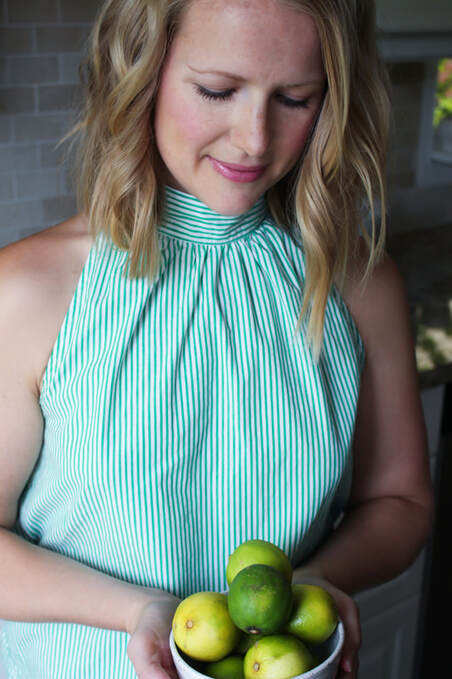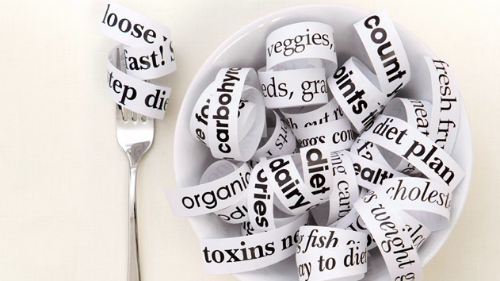|
The world of nutrition is a complicated one. Head to the Health and Wellbeing section at your local Chapters and you’ll see what I mean. There are literally walls of books telling us what to eat, what not to eat, how to cook it, and when to eat it. This would all be well and good… except that they all seem to contradict each other in varying ways. So how are we expected to make it through this life with a healthy approach if the so-called professionals can’t even agree? I pride myself in being able to read nutrition advice with an objective eye. I gather what I have learned from past resources and make my own judgments on what is truth and what is fad. Are all of my ideas surrounding health accurate? Probably not. Nutritional information is so vast, how could I possible know it all? But, I don’t feel too bad about it, considering that even world-class scientists haven’t got it all figured out yet. It is an ever-growing body of knowledge. That’s part of what I love about the industry. Things never get old. However, as confident as I am in my own journey, if I’m not careful, I too can find myself feeling muddled by over exposure to information. I start to give in to the confidently worded, persuasive writing offered up by some health guru, meditating on a beach in California. I begin to question what I know to be true or effective. Although questioning your awareness and constantly building upon what you already know is an important part of learning, it isn’t always necessary, depending on your information source. Whenever I feel this happening, I take a deep breath, shut out all of the industry clamor, and go back to the building blocks of nutrition. The best thing to do in this case, I believe, can be summed up in three words: keep it simple. Remember: a nutritious diet doesn’t have to be complicated. If you think that it does, more than likely you’re looking for some magical formula that allows you to eat chocolate cake all day long without any negative repercussions. I am here to tell you that, as far as I can see, that formula does not exist. Quite honestly, most people already possess the basic knowledge of a good diet, whether they are aware of it or not. It’s all about recognizing this knowledge and putting it into practice. So, following in Coldplay’s footsteps, I’m going back to the start. Let’s strip away all of the low-carb/paleo/juicing/nothing-but-kale-all-day-every day eating principles, and look at a few rules to live by. The following are my top five nutrition guidelines to create a healthy living regime: #1 Drink Water. I cannot stress this enough (which is why it’s #1 on the list). The importance of water is a blog post in itself, but beyond making up over 60% of your body, water flushes out toxins, plays a role in transporting nutrients throughout the body, provides padding for our joints, regulates body temperature, and helps you to feel full. Think getting your 8 glasses a day in is tricky? Many athletes aim to consume 1 gallon (or more) a day. I recently completed some consultation work with a coach who recommended this be implemented into my own plan. I have yet to reach my 1 gallon consumption goal, but not for lack of trying! I continue to strive for it, particularly on days when I am highly active. I understand the benefits it can provide (including the fact that our body burns calories as it works to circulate all of that glorious H20). To close: just drink your friggin’ water, ok? #2 Include a source or protein with every meal Protein = muscle restoration, and satiety. See my previous post on the importance of protein (plus meal ideas) here. #3 Eat Fat. The good kinds. Sadly, our society has been programmed to run for the hills when it hears the word “fat”. Consuming the right kinds of fats through your food choices is an essential part of maintaining a healthy diet, feeding your body with the necessary nutrients, and supporting various functions within the body. In their simplest form, healthy fats can be defined as unprocessed fat sources from whole foods. There are three types of good fats (each determined by their molecular makeup) and you need to ensure you consume all of them: saturated fat (if you’re consuming enough whole protein sources, you are probably already getting enough of these); monounsaturated fat (nuts, olive oil, avocado, etc.); and polyunsaturated fat (flax, fish oil, etc.). A few more points…
To sum up, make sure you are getting a balanced intake of each type of fat. They should be coming from whole, unprocessed food sources. BEWARE of highly processed, highly inflammatory vegetable oils.  #4 Cut the Sugar. I’m sure I’m not alone when I say that I am a sugar lover. I may be a health nut, but I’m still human. Of course I find sugar delicious. Who doesn’t? Alas, I hate to be the bearer of bad news, but increased levels of blood sugar can lead to fat storage (unless you’re getting the right kind, the right amount, at the right times, in which case it’s converted to glycogen and burned as fuel…. but that’s another topic for another day). In addition, after consuming a solid dose of sugar, physiologically, your body responds in a negative way. Your energy levels decrease (due to a surge of insulin, followed by a big drop—also known as a sugar crash), you become bloated and uncomfortable (because of water retention), and often, it can result in mood alteration, making you cranky and irritable. And just to lighten the mood a bit, there has been an overwhelming amount of evidence in recent research studies that suggests sugar causes various forms of cancer. It’s literally killing us. Ok, health gods. You’ve made your point. Processed sugar is out. For me, life is easier when I rid my pantry of sugary foods. If it’s not in the house, I don’t hear it taunting me from the cupboard. I’m sure you’ve heard this before, but if I can cut out processed sugar for as little as three days, I find any cravings reduce drastically. Allow it time to leave your system, and your body will take care of the rest. So, do yourself a favour and limit your sugar intake. **If you’re looking for a healthier sugar-fix, try a serving of fruit or piece of dark chocolate to keep your cravings at bay. #5 Eat when you’re hungry, not when you’re bored. Oh man, I can definitely be guilty of this one. Eating is one of my favourite past times. Just the other day, a friend and I were laughing over our shared hobby of counting down the minutes until it was appropriate to eat our next meal. Listening to your body vs. responding to boredom is an ongoing battle for many of us. Not to mention, society connects so many social activities with eating, even when it isn’t necessary (watching a movie? Ya, I’m definitely going to need a snack for that. Yes, I know I just ate a dinner ten minutes ago… what’s your point?). However, I believe that practice makes perfect. Eat when you are truly hungry—clearly your body needs something, whether that means a dose of energy, or that it’s craving nutrients of some kind. But try to recognize that feeling when you’re searching through every pantry in the kitchen, trying to decide what to snack on while you watch TV. I don’t know about you, but that’s when things can get a little out of hand for me. When I’m really in a pinch and that pull to the kitchen is just a little stronger than my available will power, a teaspoon of natural peanut butter is often enough to keep my restless belly at bay. I also enjoy herbal teas in the evening (insert groan and eye roll here). **Now, before anyone freaks out on me, I would like to include a disclaimer: you can still snack during a movie. I understand the pleasure this brings, and I am not a kill-joy (most of the time). This is a just a simple guideline to incorporate into your everyday life. It’s not to say you can’t indulge every now and then. Live your life and enjoy it. Moderation is key. There are many other recommendations I could include here for optimal health, but these five are on the top of my list. Many of you probably follow these pointers already, so keep it up. If you have reached a place where you feel that some major life changes need to occur in order to become a healthier version of yourself, these principles are a great place to start. However, depending on your personality type, it may not be smart to dive in headfirst. Try incorporating one guideline at a time. Each week, add one more goal to your daily regime. After a month of positive changes, you’ll notice a difference in how you feel, and will have taken one big step towards increasing your longevity.
0 Comments
Leave a Reply. |
|


 RSS Feed
RSS Feed